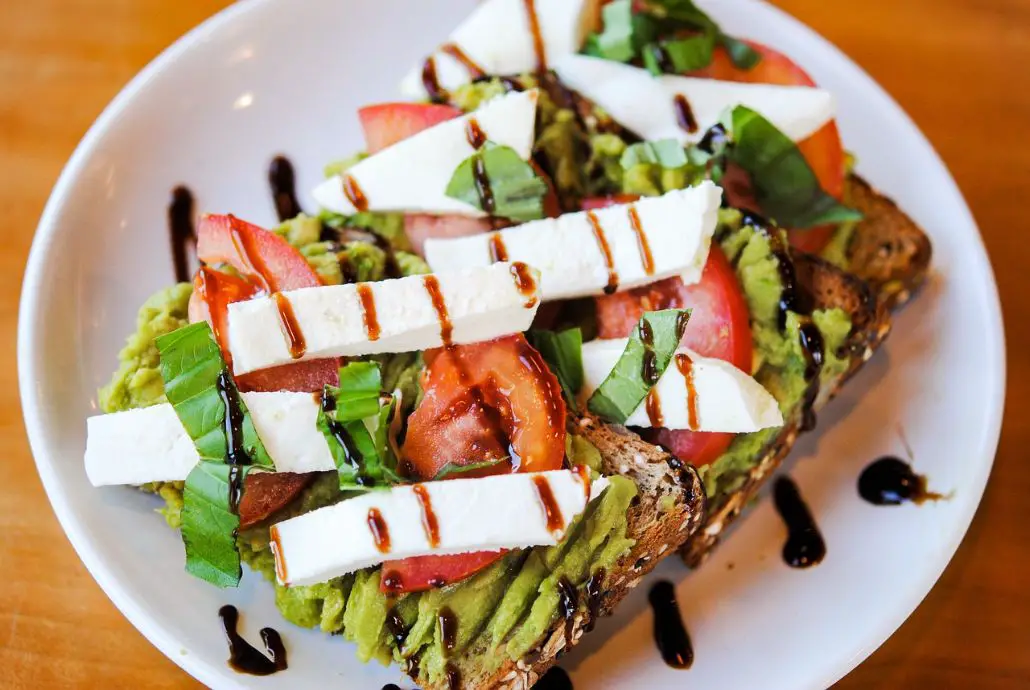
Avocado is one of the most nutrient-dense foods that can help you achieve your weight loss goals while keeping your body healthy. This green fruit is rich in monounsaturated fats and other essential nutrients such as vitamins, minerals, and antioxidants that can help you lose weight, reduce belly fat, and improve your overall health.
In this article, we will show you how to eat avocado for weight loss, share some tips and tricks on incorporating it into your daily diet and explore the various health benefits of consuming avocados regularly.
Table of Contents (click to expand)
Part 1: The Health Benefits of Eating Avocados
Avocados are packed with essential nutrients that can help you maintain a healthy body, including:
Monounsaturated Fats
Monounsaturated fats are a type of dietary fat. They are considered healthier fats because they reduce harmful low-density lipoprotein (LDL) cholesterol in the blood while increasing beneficial high-density lipoprotein (HDL) cholesterol. This balanced lipid profile may help lower the risk of heart disease and stroke. Beyond cardiovascular benefits, some research suggests that monounsaturated fats may also aid in weight loss and help control insulin levels and blood sugar, which can be particularly beneficial for people with type 2 diabetes.
Related: How to Make Cucumber Water for Weight Loss: A Refreshing Recipe for Health and Wellness
Vitamins and Minerals
Avocados are a great source of monounsaturated fats and a rich source of essential vitamins and minerals. Vitamin C, an important antioxidant, contributes to immune defense by supporting different cellular functions of the immune system. Vitamin K is crucial for blood clotting and bone metabolism. Vitamin E also acts as an antioxidant and helps protect the body from damage caused by free radicals. Potassium, a critical mineral, aids in nerve function, muscle contractions, and maintaining a healthy blood pressure level. Dietary fiber, while not technically a vitamin or mineral, is also significant as it aids in maintaining bowel health, helps control blood sugar, assists in achieving a healthy weight, and can lower cholesterol levels.
Oleic Acid
Oleic acid is a monounsaturated fat that avocados are rich in. This fatty acid is known to help reduce LDL (bad) cholesterol levels while increasing HDL (good) cholesterol levels, reducing the risk of heart disease. It also possesses anti-inflammatory properties, which may contribute to its overall health benefits. Some studies also suggest that oleic acid might play a role in brain health and could potentially help reduce symptoms of depression and anxiety.
Antioxidants
Avocados are abundant in antioxidants, which can neutralize free radicals in the body. Free radicals are harmful substances that can cause cell damage, leading to various chronic diseases such as heart disease, cancer, and diabetes. The antioxidants in avocados include carotenoids, which support eye health and may reduce the risk of certain cancers; tocopherols, a form of vitamin E that helps fight off infections and diseases; and phenols, which have anti-inflammatory and antiviral properties. These antioxidants work together to enhance the body’s overall health and well-being.
Part 2: How Avocado Can Help You Lose Weight
Healthy Fats
The healthy monounsaturated fats in avocados can contribute to weight loss in two primary ways. First, fats are more energy-dense than proteins or carbohydrates, providing a greater sense of fullness or satiety. This feeling of satisfaction can reduce hunger and overall calorie intake. Secondly, the specific type of monounsaturated fats found in avocados, mainly oleic acid, may increase the rate of fat burning and decrease the desire to eat, both crucial factors in weight management.
Fiber
The high fiber content in avocados makes them a weight-loss-friendly food. Dietary fiber adds bulk to the diet, slows digestion, and promotes feelings of fullness, which can prevent overeating. It also aids in maintaining regular bowel movements and supports overall digestive health. Additionally, some types of fiber, like the soluble fiber found in avocados, can feed the beneficial gut bacteria, which is linked to improved metabolic health and weight control.
Fewer Calories
While avocados contain more calories than many other fruits and vegetables, they are far less energy-dense than many processed and fast foods. Incorporating avocados into your meals instead of higher-calorie, less nutrient-dense foods can help you manage your overall calorie intake, which is crucial for weight loss.
Related: How to Tighten Skin After Weight Loss Naturally
Abdominal Fat
Abdominal fat, or visceral fat, is a particularly harmful type of fat that builds up around the organs in the abdomen. Studies suggest that a diet high in monounsaturated fats, like those found in avocados, can help reduce abdominal fat. This reduction is beneficial because abdominal fat increases the risk of heart disease, type 2 diabetes, and other chronic conditions. The fiber in avocados can also contribute to a reduced risk of weight gain and obesity by promoting feelings of fullness and naturally decreasing calorie intake.
Part 3: Incorporating Avocado into Your Diet
Avocado Toast
Avocado toast is a versatile and healthy choice for breakfast or a midday snack. It’s easy to prepare and can be customized to fit your taste preferences. Mash an avocado and spread it on whole grain bread, then top with seasonings like salt and pepper. Add eggs, smoked salmon, or fresh vegetables for extra protein and vitamins.
Guacamole
Guacamole is a traditional Mexican dip that features avocado as the star ingredient. To make guacamole, mash ripe avocados and mix with lime juice, chopped onion, minced garlic, diced tomatoes, and chopped cilantro. This blend creates a flavorful, nutritious condiment that pairs well with tortilla chips, raw veggies, or as a topping on tacos and burritos.
Smoothies
Adding avocados to your smoothies is an excellent way to incorporate this nutritious fruit into your diet. The mild flavor of avocado complements a wide variety of fruits and veggies, and its creamy texture helps create a satisfying smoothie consistency. For a nutrient-packed smoothie, blend avocado, almond milk, a ripe banana, a handful of spinach, and a spoonful of chia seeds. Add honey, agave nectar, or a sugar substitute if you desire a sweeter flavor.
Salad Dressing
Using avocados as a base for salad dressing is a healthy alternative to store-bought dressings that often contain additives and preservatives. To make an avocado-based salad dressing, blend mashed avocado, extra virgin olive oil, lemon juice or lime juice, and seasonings like salt and pepper. You can also add herbs like basil or cilantro for added flavor. This dressing can be used on various salads, making it a versatile addition to your culinary repertoire.
Part 4: Avocado Recipes for Weight Loss
Here are some other healthy fat and delicious avocado recipes that can help you lose weight:
Avocado and Egg Breakfast Bowl
This nutrient-dense breakfast bowl is an excellent way to start your day. To prepare, cook a portion of quinoa according to the package instructions. In a separate pan, scramble some eggs. Once cooked, combine the quinoa and eggs in a bowl, then top with sliced avocado and your choice of vegetables like diced bell peppers, cherry tomatoes, or spinach. Add some salt and pepper or hot sauce for an extra kick.
Grilled Chicken and Avocado Salad
This protein-packed salad can be a satisfying lunch or dinner. Start by grilling chicken breasts until fully cooked. While the chicken grills, assemble a salad with mixed greens, sliced avocados, and shredded cheddar cheese. Once the chicken is done, slice it and place it on the salad. Dress with a light vinaigrette or your homemade avocado dressing.
Avocado and Black Bean Tacos
These plant-based tacos are full of fiber and healthy fats. To prepare, warm whole-grain tortillas in a pan or oven. Spread mashed avocado on each tortilla, then top with cooked black beans and diced tomatoes. Add a sprinkle of cayenne pepper or a dollop of salsa for a touch of heat. These tacos can be served with grilled vegetables or a salad for a balanced meal.
Related: How to Make Chia Seeds Smoothie for Weight Loss: A Comprehensive Guide
Avocado and Shrimp Ceviche
This refreshing ceviche can be served as a light lunch or an appetizer. To make this recipe, combine cooked shrimp (you can also use raw shrimp and let the acid from the lime “cook” it), diced avocado, fresh lime juice, chopped cilantro, and diced tomatoes in a bowl. Mix well and let it marinate in the fridge for at least an hour before serving. This allows the flavors to blend. Serve the ceviche with whole-grain crackers or on lettuce leaves for a low-carb option.
Part 5: Avocado Myths and Facts
There are many myths surrounding the consumption of avocados. Here are some facts to help set the record straight:
Avocado is High in Saturated Fat
This about avocado consumption is a common misconception. While avocados are high in fats, they are predominantly monounsaturated fats, specifically heart-healthy oleic acid. Monounsaturated fats can help lower harmful cholesterol levels and benefit heart health. In contrast, more saturated fats in foods like red meat and full-fat dairy products can raise dangerous cholesterol levels and increase the risk of heart disease when consumed in excess.
Avocado is Bad for Cholesterol
The opposite is true. Avocados can help lower harmful cholesterol levels thanks to their high monounsaturated fats and dietary fiber content. Several studies have shown that consuming avocados regularly can reduce levels of LDL (low-density lipoprotein) cholesterol, often referred to as “bad” cholesterol, while increasing levels of HDL (high-density lipoprotein) cholesterol, or “good” cholesterol. An improved cholesterol profile can reduce the risk of heart disease and stroke.
Avocado Goes Bad Quickly
While it’s true that avocados can ripen and become overripe relatively quickly, there are ways to extend their shelf life. If you have a ripe avocado that you’re not ready to use, storing it in the refrigerator can slow the ripening process and keep it fresh for a few more days. If you’ve already cut into the top half of an avocado or mashed it, storing it with a bit of lemon or lime juice can prevent it from browning. Furthermore, mashed avocado can be stored in the freezer for several months and used later in dishes like guacamole, smoothies, or avocado toast. Please keep it in an airtight container to prevent freezer burn and maintain quality.
Related: How Long Does it Take to Lose Weight When Lifting Weights?
Part 6: Avocado Substitutes
If you’re allergic to avocados or don’t like the taste, there are many healthy diet substitutes you can try, including:
Olive Oil
Like avocados, olive oil is high in heart-healthy monounsaturated fats and is a staple in the Mediterranean diet, known for its numerous health benefits. Olive oil can be an excellent substitute in recipes that call for mashed avocados, such as salads or dressings. Although it doesn’t have the same creamy texture, it can provide a similar richness and flavor depth as adding avocado to your dishes.
Sour Cream
Sour cream can mimic the creaminess of mashed avocado in recipes like guacamole or as a topping for dishes like tacos or nachos. However, be mindful that sour cream is higher in saturated fat than avocado oil and lower in monounsaturated fat than avocados. Lower-fat versions of sour cream are available if you’re watching your fat intake.
Cocoa Powder
Cocoa powder can be a good alternative to avocado in certain sweet recipes, such as smoothies or desserts. While it doesn’t provide the same creaminess as avocado, it is low in fat and antioxidants. Moreover, cocoa powder has been linked to numerous health benefits, including improved heart health due to its high flavanol content.
Sliced Apple
While the texture and flavor differ significantly, sliced apples can provide a fresh and crunchy alternative to sliced avocado in salads or sandwiches. Apples are a good source of dietary fiber and vitamin C, although they don’t contain the same monounsaturated fat content as other avocados. Nonetheless, their sweet, slightly tart flavor can add a different dimension to your meals.
Related: How to Manifest Weight Loss: Using the Law of Attraction to Achieve Your Ideal Body
Conclusion
In conclusion, avocados are a nutrient-dense food that can help you achieve your weight loss goals while keeping your body healthy. They are rich in monounsaturated fats, vitamins, minerals, and antioxidants that can benefit your overall health and well-being. By incorporating avocados into your daily diet and following the tips and tricks mentioned in this article, you can achieve your weight loss goals and maintain a healthy lifestyle.
Frequently Asked Questions
How Many Avocados Should I Eat a Day to Lose Weight?
While avocados are packed with beneficial nutrients and healthy fats, they’re also relatively high in calories. Therefore, it’s essential to consume them in moderation when you’re trying to lose weight. A standard recommendation is limiting your avocado intake to about half a medium avocado per day, roughly equivalent to a serving. This provides approximately 120 calories and easily fits into a balanced, calorie-controlled diet.
Can Avocados Help You Lose Belly Fat?
Avocados could potentially aid in losing weight and reducing belly fat due to their monounsaturated fat content. This type of fat has been linked to decreased waist circumference and improved overall body composition. However, it’s important to note that avocados won’t directly cause fat loss. Like any other food, they should be part of a balanced diet and healthy lifestyle for weight loss and overall health.
Can You Eat an Avocado a Day to Lose Weight?
Eating a whole avocado a day and still losing weight is possible, but it depends on the rest of your diet. If your daily calorie needs for weight loss are high enough, and you enjoy eating avocado, eating one a day could fit within your plan. However, if you’re following a lower-calorie diet, a whole avocado may be too much, and a half or a quarter might be more appropriate.
What Does Eating 1 Avocado a Day Do?
Eating one avocado a day can provide many beneficial nutrients, including healthy monounsaturated fats, fiber, vitamin K, folate, vitamin C, potassium, and vitamins. The healthy fats and fiber in avocados can help keep you full and satisfied, potentially aiding in weight management. The monounsaturated fats are also beneficial for heart health. However, due to their high-calorie content, they should be eaten in the context of a balanced diet.





































